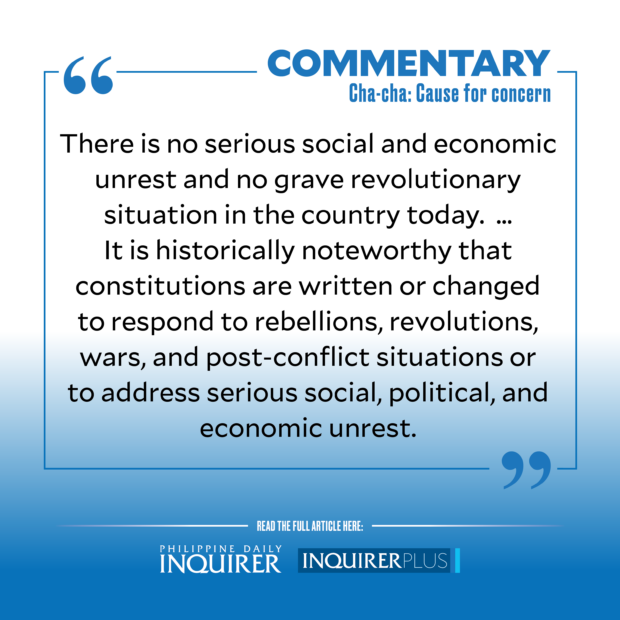Cha-cha: Cause for concern
House Bill No. 7352, the accompanying bill to Resolution of Both Houses No. 6 that calls for a hybrid constitutional convention (con-con) to amend or revise the 1987 Constitution, is a cause for concern.
There is no serious social and economic unrest and no grave revolutionary situation in the country today. And under the aegis of the 1987 Constitution, there has been a peaceful transfer of power through elections from President Corazon C. Aquino up to President Marcos Jr. The three branches of government (executive, legislative, and judiciary), constitutional commissions, and local government units are functioning well.
Article continues after this advertisementIt is historically noteworthy that constitutions are written or changed to respond to rebellions, revolutions, wars, and post-conflict situations, or to address serious social, political, and economic unrest. The 1787 US Constitution, the longest running written constitution, was fashioned to meet the challenge of Shays’ Rebellion in Massachusetts and to correct the flawed Articles of Confederation which had no central authority and a Congress inutile to enforce its laws. The 1947 “Peace Constitution” of Japan was written shortly after World War II. The Constitution of the Federal Republic of Germany was prepared also after World War II that witnessed the infamous Holocaust and the reign of terror by the Nazis. The French Constitution of 1958 was done when the government was faced with instability (withdrawal from its colonies, Viet Minh’s victory over France in 1954, and the French colony of Algeria was beset with violent student demonstrations). The Nicaraguan Constitution of 1987 was promulgated after the Sandinista-led revolution against the Somoza regime. The 2015 Constitution of Nepal was the result of crises and transformations in that country, that included a “people’s war” and mass mobilization in the southern part. The 1965 Constitution of Singapore was done after its independence in order to safeguard minority interests in the newly independent island state and contain the communist threat at that time. The seven Filipino constitutions (1897 Biak-na-Bato Constitution, 1899 Malolos Constitution, 1935 Constitution, 1943 Japanese Constitution, 1973 Constitution, the 1986 Freedom Constitution, and the 1987 Constitution) were the offshoots of revolutionary and turbulent stages in Philippine history.
The untimely call for Charter change (Cha-cha) is likewise unwise. The proposed con-con with 253 elected delegates and 63 appointed ones (appointed by the speaker of the House of Representatives and the president of the Senate) can cost between P10 billion and P15 billion. This colossal amount can best be used to generate inclusive employment and livelihood opportunities amid soaring food and energy prices, and broaden socioeconomic programs for the poor and marginalized. To this date, there are many social justice provisions in the 1987 Constitution waiting for legislation.
Still unwise because the con-con, from its very nature, cannot limit itself to tweaking the economic provisions of the 1987 Constitution. Law and jurisprudence is clear that a con-con or a constituent assembly opens up the entire fabric of the constitution for amendment or revision. When this happens, the form of government can change, the nature of the legislature from bicameral to unicameral can happen, the life-begins-from-conception provision can disappear, the antipolitical dynasty provision can be set aside, the anti-bases provisions can be modified, the bill of rights provisions can be moderated and the social justice provisions can be weakened. Finally, the “hybrid” composition of the con-con (elected and appointed delegates) is an invitation to division and discord. The closest example of a “hybrid” con-con was for the 1899 Malolos Constitution composed of elected delegates chosen by balloting in provincial assemblies, and of appointed delegates chosen by the president because there were regions at that time under unstable military and civilian conditions. The delegates to the 1934 con-con and the delegates to the 1971 con-con were all elected.
Article continues after this advertisementIt will be a singular honor for Congress to undertake bold legislative initiatives that will push further to limitless possibilities the frontiers of democracy and social justice. Time to retool the antiquated Omnibus Election Code of 1985, to pass the Human Rights Code introduced during the First Congress, to refine the Party List System Act consistent with the “marginalized and underrepresented” intent of the 1987 Constitution, to flesh out the anti-dynasty provision in the 1987 Constitution, to give the Commission on Human Rights the power to prosecute, and to boost with laws the many provisions in the 1987 Constitution that start with “The State shall …” Our lawmakers will help build an inclusive, just, and humane society if they wisely manage the demands of the present and undertake to raise the country to the unfinished visions of the 1987 Constitution.
———————
Rene V. Sarmiento was a member of the 1986 Constitutional Commission.

















